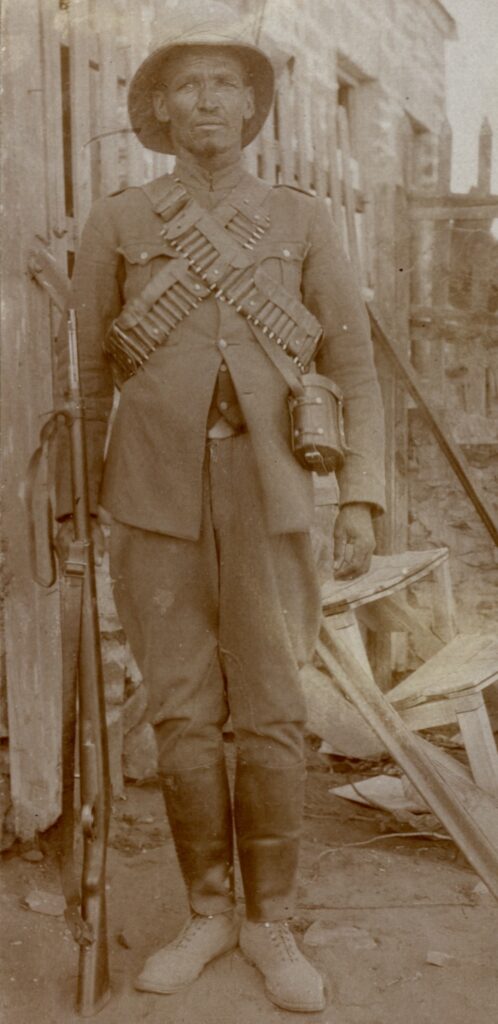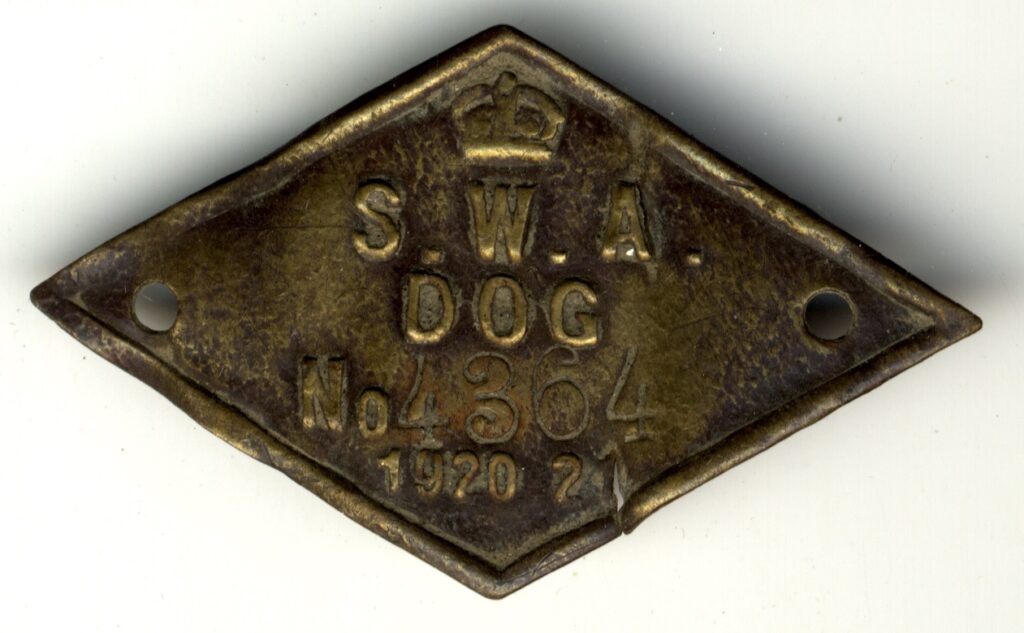By: Bernard C. Moore (Michigan State University)
originally published 4 September 2015 [LINK TO ORIGINAL]
“This photo is of Abraham Morris, my grandfather. He fought against the Germans, and then later, the South Africans.” Mr. Timoteus Morris was giving me a short tour of the community museum at Warmbad; every exhibit, every photo and map – he knows the history. “You see these military reports; these were from the 1922 Bondelswarts War, when the Nama people, my people, fought the South Africans.” I asked why the war began – what caused it? Mr. Morris gave three reasons: “Dog Tax, Branding Irons, and Land.”

It’s sometimes difficult to explain to people why I’m studying the history of the dog tax in Namibia. Many researchers from the USA tend to romanticise certain aspects of history – big ideas, big events. When I say I’m working on the dog tax, people American and Namibian alike tend to sometimes look at me like I’m wasting my time; they often respond with questions like: “Is this needed”? History, though, isn’t just the story of big men and big events, it’s the story of how those big events effected the lives of ordinary people. In the Namibian case, looking at the dog tax is a way to understand colonialism and how it created a system to coerce Namibians into the labour force.
Warmbad was one of the first settled places in Namibia and it was once a much larger town before the building of the railway and the growth of Karasburg and Keetmanshoop. As the Bondelswart Nama migrated to the area from the Orange River, they came with their dogs. The Warmbad hot springs were discovered when the Kaptein saw the dogs were soaking wet – which was a sign that there must be a permanent water source. With increased German settlement at the end of the nineteenth century, though, many Bondelswarts found their way of life becoming increasingly at risk – shepherding was not as easy as it once was. White settlement had taken much of the prime land and water holes, so it’s not surprising that they joined up with the rebellion in 1904. Superior weaponry and supplies, however, forced the Bondelswarts to accept a “Treaty of Submission” at Ukamas in 1906. This reduced the size of their territory, initiated pass laws to leave the reserve, and placed them under German law.
In addition, by 1907, the Germans passed the Hundesteuer Ordinance – the dog tax. With regards to the Bondelswarts, negotiations at Ukamas exempted the reserve and the Warmbad location from other fees and taxes, especially the grazing fees. When the South Africans took over after WWI, the dog tax became one of the few enforceable taxes in the Bondels reserve; and for that reason, it was enforced quite vigorously.
Each year, all dogs had to be registered with the magistrate and have a small metal badge attached around the neck (see photo). Under South African rule, the fees increased significantly. Anyone who failed to pay the tax, African or European, was given a fine, the dog was killed, and if he was unable to pay the fine, he was sentenced to prison with hard labour. The 1917 tax collection resulted in at least 3,000 African-owned dogs killed by police; the number of European-owned dogs killed: 135.
By 1921, the tax was increased to £1 for a “standard dog” and £5 for a greyhound or a “native hunting dog.” What was a “native hunting dog”? No one really knew; the magistrates repeatedly wrote to the administration asking for advice for how to determine it. It was up to the individual colonial policeman to decide what dog was a hunting dog and what wasn’t. The only guarantee is that Europeans could not own a “native hunting dog.”
Now why does this matter? It’s because £5 was a lot of money for a Namibian to pay to have his dog registered. At that time, £5 was about three-months farm wages, or the sale of 5-8 small stock. For the registration of a dog, that was a big monetary sacrifice; and for that reason, many Namibians had to hide or kill their own “native hunting dogs” in order to avoid being prosecuted by the police. But why the focus on “native hunting dogs”?
The SWA administration firmly believed that dogs were behind destruction of game. However, only in official communications regarding dog taxes were they blamed. In the archival files labeled “Game: Destruction of,” the culprits were drought as well as poaching by White farmers and South African rifle parties. So although Black Namibians were hunting game from time to time with dogs, this was much more opportune than planned, and it was not the reason for destruction of game.
Perhaps the reason for the dog tax, though, lies in the labour question. Throughout the central and southern parts of SWA at this time, there was a serious farm labour shortage. The growth of the Karakul industry increased labour demand, but yet the mines were still paying higher wages. Indeed, in some of the Magistrates reports, they note that hunting with dogs was a “lazy way” of earning a living, and hunting offset the “moralizing” effects of “honest labour” – contract/wage labour.
Taxing dogs, therefore, had two major results. First, like other colonial taxes, they “monetized” economies, creating a necessity for cash possession and exchange. Secondly, and perhaps more importantly, limiting the number of dogs used in shepherding activities severely constrained the ability of shepherds to protect and grow their stock. Paying the tax for dogs, often “native hunting dogs,” necessitated selling some stock each year for slaughter, thereby preventing stock accumulation, or else one had to take up wage labour on White-owned farms.

“Bernie, I have something to show you.” Mr. Werner Hillebrecht, archivist at the National Archives of Namibia, brought me into his office and switched on his computer. “I found a little bit of material that’s related to your project.” He clicked a file, and up came a photo of a 1920-1921 Dog Badge, given to someone who successfully paid his dog tax (see photo). “How cool is this?” He remarked.
The brass dog tax badge looks remarkably like the old German pass tokens for labour in the police zone; perhaps this similarity is not just coincidental, but deeply symbolic. The dog tax played a large role, along with other state policies, in pulling Namibians away from self-sufficient livelihoods into contract/wage labour. The history of the dog tax isn’t the story of big men or big events, but the story of how those big events affected the daily lives of every Namibian who just wanted to hang about with man’s best friend.
